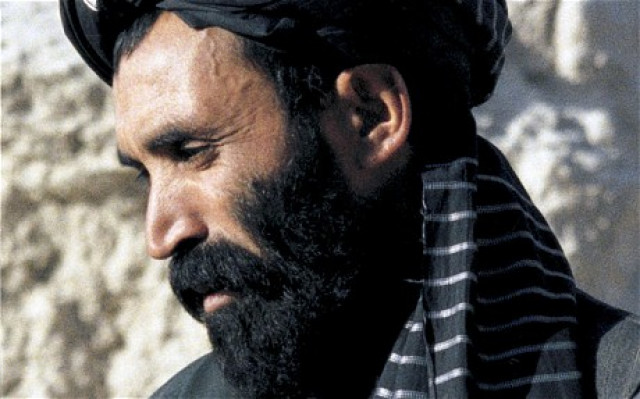Much-needed blessings: Mullah Omar endorses Taliban peace talks
Supremo says Afghan Taliban are not agents of Pakistan or Iran

Taliban leader Mullah Omar. PHOTO: REUTERS
The elusive supreme leader of the Afghan Taliban has indirectly endorsed the Murree Peace Process days after Taliban cadres had a rare face-to-face meeting with Afghan government officials in the popular tourist resort.
Though Mullah Omar didn’t mention the July 7 meet-up in his traditional Eid message, many believe his mentioning of ‘political endeavours’ was a reference to the Murree Peace Process. Mullah Omar’s whereabouts have been unknown since the Taliban regime in Kabul was toppled by a US-led coalition in 2001.

Afghan President Ashraf Ghani also welcomed the Murree rendezvous, saying that he was hopeful the talks would lead to restoration of durable peace in his country which has been wrecked by years of insurgency and civil war.
“The whole nation wants peace. During the past 14 years we tried to hold face-to-face talks but could not succeed. But it has happened now and the second round of talks will be held within a few weeks,” Ghani said during a visit to Khost where he offered condolences to the families of those killed in a recent suicide car bombing. Over 30 people, including women and children, were killed in the attack that took place near an American base.
“We have also discussed peace talks with Pakistan and told the neighbouring country to end the undeclared war,” Ghani said, according to the Afghan media. He called upon the Taliban to come up with a list of their demands at the second round of talks.
Mullah Omar’s statement has kindled hopes for progress in peace talks. “Concurrent with the armed Jihad, political endeavours and peaceful ways for achieving these sacred goals are a legitimate Islamic principle and an integral part of Prophetic politics,” the Taliban supremo said in the message posted on the Taliban official website and emailed to the media.

“As our holy leader, the beloved Prophet (peace and blessings be upon him), was actively engaged in fighting the infidels in the battlefields of Badr and Khyber, and at the same time he participated in agreements beneficial for Muslims, held meetings with envoys of infidels, sent messages and delegations to them and on various occasions even undertook the policy of face-to-face talks with warring infidel parties,” Mullah Omar said.
The statement has effectively put to rest a guessing game about the legitimacy of the Murree talks after the spokesman for the Qatar-based political office of the Taliban had said that none of the Qatar office members had taken part in the process.
Mullah Omar reiterated the political powers of the Qatar office, but did not stop other Taliban leaders from taking part in peace process. “We have established an office for political affairs, entrusted with the responsibility of monitoring and conducting all political activities,” he added.
“The objective behind our political endeavours as well as contacts and interactions with other countries and our own Afghans is to put an end to the [foreign] occupation and to establish an independent Islamic system in our country,” Mullah Omar said.
Taliban are not Pakistan’s agents
In a first, Mullah Omar also rebuffed allegations that Pakistan and Iran were pulling the strings of the Afghan Taliban. “Some circles accuse the Mujahidin of being agents of Pakistan and Iran. This is an utterly unjust verdict because neither our past nor the prevailing circumstances attest to these false accusations,” he said.
He said the Taliban have sought “cordial relations not only with Pakistan and Iran” but also with all neighbouring countries. “We have been the well-wishers of all masses of all neighbouring, regional and world countries and we are determined to pursue this wise policy.”
With using political option, the Taliban leader also justified the armed struggle as ‘invading troops are still stationed in Afghanistan’. “Jihad is as obligatory today as it was in the beginning of foreign occupation because our homeland Afghanistan is still under occupation and both its land and air space are controlled by the invaders,” he said.
Published in The Express Tribune, July 16th, 2015.



















COMMENTS
Comments are moderated and generally will be posted if they are on-topic and not abusive.
For more information, please see our Comments FAQ